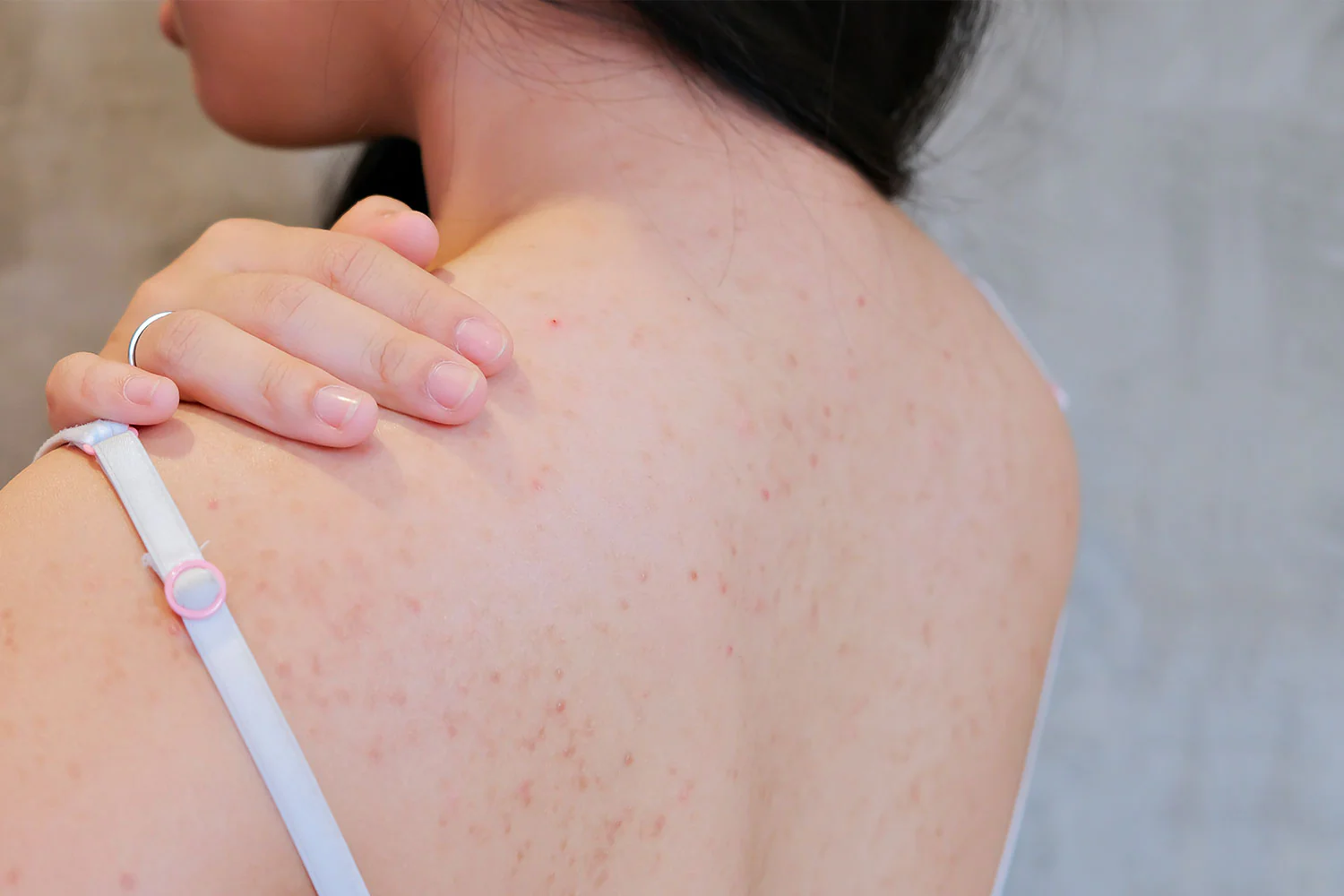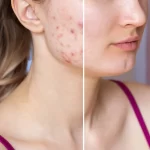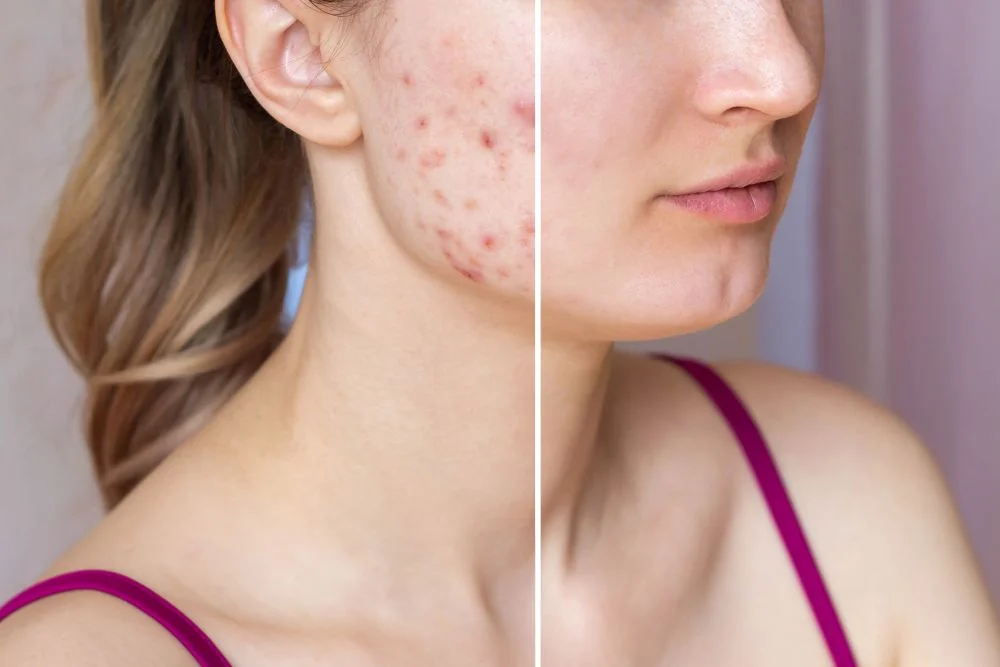Dermatologists may recommend supplements like zinc, omega-3s, probiotics, and certain vitamins to support skin health and reduce inflammation, but overdosing on B12 or vitamin A can worsen acne.
Supplements work best as complements to prescription treatments, not stand-alone cures. The most effective acne treatment remains professional, prescription-grade care, with supplements as optional support under medical guidance.
Dermatologists recommended acne supplements to provide patients with clear guidance on what may help and what is not supported by science. At DermOnDemand, led by Dr. Alicia Atkins, the goal is to provide evidence-based recommendations that save time and protect skin health.
This article explains which supplements may improve acne, when they should be avoided, and how they fit with prescription treatments.
Key Takeaways
- Dermatologists recommend supplements for acne, such as zinc, omega-3 fatty acids, and probiotics, which may help reduce inflammation and support skin health.
- Vitamins such as B6, D, and select multivitamins can fill nutritional gaps, but overdoses – especially of vitamin B12 or vitamin A – may worsen acne.
- Supplements alone rarely treat acne; they work best as supportive options alongside dermatologist-prescribed therapies.
- Safety matters: some products carry side effects, drug interactions, or pregnancy risks, and in the United States, the Food and Drug Administration does not regulate them as it does medications.
- The fastest and most effective way to treat acne is through prescription-grade care, with supplements serving as optional additions under professional guidance.
What Do Dermatologists Recommend for Acne?
When people ask dermatologists what they recommend for acne, they expect safe, practical answers. Research shows that some supplements can support skin cell function and reduce inflammation, while others have little effect.
The most important point is that dietary supplementation should never replace prescription therapy when acne is severe or persistent.
Which supplements help clear acne?
Dermatologists most often mention zinc, omega-3 fatty acids, probiotics, and some B vitamins. These options help reduce oil production from the sebaceous gland, support hormonal balance, and calm skin irritation. However, the benefit is usually modest and works best as a complement to a full treatment plan.
Zinc: best supplement for acne-prone skin
Zinc plays a role in wound healing and in regulating the sebaceous gland. Several studies suggest zinc may improve acne by reducing inflammation. Common forms include zinc gluconate and zinc sulfate. Patients should be cautious with dosing since high amounts can cause nausea or long-term side effects like copper deficiency.
- Zinc Picolinate – NOW Foods
- Why: Zinc supports skin healing and helps regulate oil activity in sebaceous glands.
- Dermatologist Note: Stick to safe daily limits (usually 25–30 mg); excessive zinc may cause side effects such as nausea.
- Where to Buy: NOW Foods Zinc Picolinate
Omega-3s: a trusted supplement for pimples
Fish oil, a natural source of omega-3 fatty acids, is sometimes touted as a supplement for acne. These fatty acids may reduce inflammation and improve the skin barrier. Some small trials show reduced lesion counts when omega-3s are added to standard care. Patients should confirm the correct dose and the source of the fish oil, as not all fish oil supplements are equal.
- Fish Oil (Omega-3) – Nordic Naturals Ultimate Omega
- Why: Provides EPA and DHA, omega-3s that can reduce inflammation and support skin health.
- Dermatologist Note: Quality matters – this product is third-party tested for purity and freshness.
- Where to Buy: Nordic Naturals Ultimate Omega
Probiotics: balancing gut health and acne
Probiotics can influence skin health by regulating the immune system and gut microbiota. A balanced gut environment may lower systemic inflammation and improve acne. While results vary by strain, evidence suggests that oral supplementation can support treatment.
Patients should choose products that have been reviewed for quality, since probiotics are regulated as dietary supplements, not as drugs, by the Food and Drug Administration.
- Probiotics – Culturelle Daily Probiotic
- Why: Probiotics can balance gut bacteria, which may indirectly improve acne by lowering systemic inflammation.
- Dermatologist Note: Strains like Lactobacillus rhamnosus GG are well studied and generally safe.
- Where to Buy: Culturelle Daily Probiotic
Vitamin A and retinoids: benefits and risks
Vitamin A affects skin cell turnover and has long been linked with acne treatment. Prescription retinoids are derived from vitamin A and remain among the most effective acne treatments. However, oral vitamin
Supplementation is risky at high doses, with side effects ranging from liver issues to congenital disabilities. Patients should never self-dose with high vitamin A without professional guidance.
Niacinamide and B-complex: emerging options
Niacinamide, a B-complex vitamin, has anti-inflammatory properties and may improve acne when applied topically. Oral forms are being studied but are less proven.
Other B vitamins, such as vitamin B6 and pantothenic acid, play roles in skin metabolism. Supplementation can sometimes help, but overdoses, especially of vitamin B12, may worsen acne in certain cases.
Vitamins and Deficiencies Linked to Acne
Nutritional gaps can sometimes contribute to breakouts. Understanding the link between deficiencies and acne helps patients make better choices.
A dermatologist recommended vitamins for acne.
Dermatologists sometimes advise checking vitamin D, zinc, and B-complex levels in patients with stubborn acne. While not cures, these vitamins and minerals can support general skin health. Supplementation should always stay within safe ranges to avoid unwanted side effects.
What deficiency causes acne?
No single deficiency directly causes acne, but low levels of vitamin D, zinc, and some B vitamins may worsen skin inflammation. For example, a vitamin B6 deficiency can impair hormone regulation, potentially affecting acne. Balanced nutrition is a safer strategy than chasing one nutrient.
Best multivitamin for acne-prone skin
Some patients ask about the best multivitamin for acne-prone skin. While no single multivitamin is proven to cure acne, a balanced formula that includes zinc, vitamin D, and antioxidants may support skin health. Multivitamins should not replace prescription care, but they may help reduce the risk of dietary gaps.
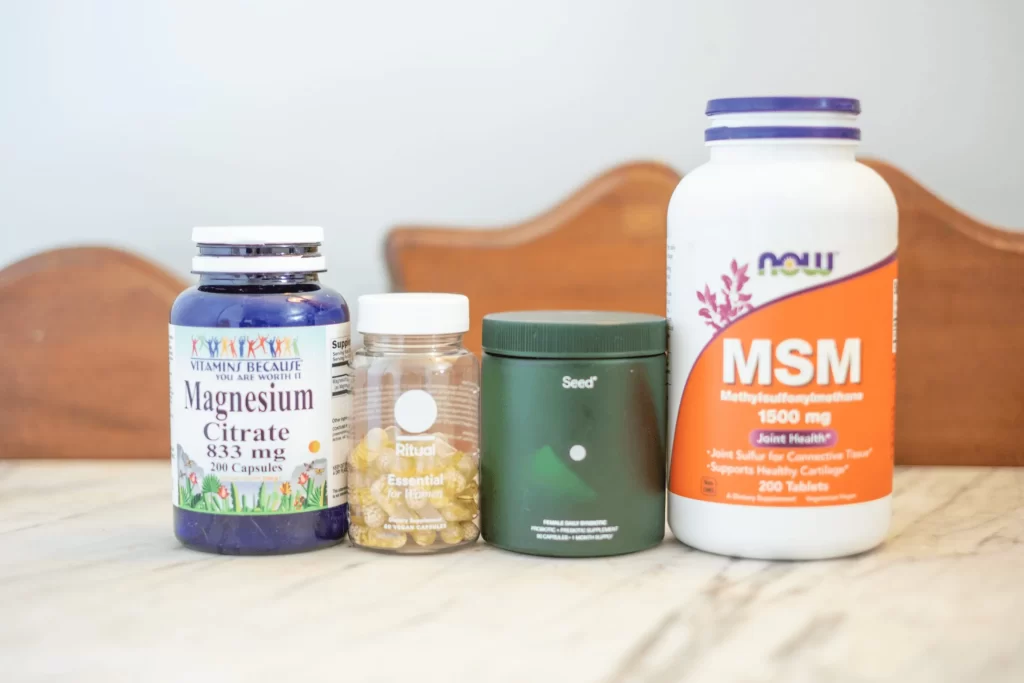
Supplements for Scars, Hormonal & Cystic Acne
Acne varies by type, and so do the supplements people explore. Dermatologists stress that results differ depending on whether the concern is scars, hormonal flare-ups, or cystic breakouts.
Acne scars: Do supplements help?
Supplements cannot erase scars, but they may support skin cell repair. Collagen peptides, vitamin C from citrus fruit, and green tea extract are sometimes promoted for this purpose. While they may help with overall skin health, scars typically require in-office procedures, such as laser treatments or microneedling, to achieve visible improvement.
Vitamins for pimples and scars
Some patients use vitamin C and vitamin E to reduce post-inflammatory marks. These vitamins may improve acne recovery, but do not replace procedures when scars are deep. Oral vitamin supplementation is best viewed as supportive rather than corrective.
Hormonal acne: dermatologist-recommended supplements
Hormonal acne is linked to fluctuations in androgen levels and excess oil production by the sebaceous glands. Some supplements, such as inositol, vitamin B6, and zinc, may support hormonal balance. Still, patients with true hormonal acne often need prescription medications for meaningful control.
Best vitamins for hormonal acne
Vitamin D and B-complex vitamins are commonly mentioned for hormonal acne. Adequate intake can support skin function and hormone metabolism. However, doses should remain within safe ranges, as excessive vitamin B12 intake, for example, may worsen acne in some individuals.
Cystic acne supplements and safe use
Cystic acne is severe and often painful. No supplement alone can treat cystic acne effectively. While fish oil, zinc, and probiotics may reduce inflammation, prescription care is usually required. Dermatologists caution against relying on supplements for cystic acne since delays in proper care may increase the risk of scarring.
Supplements for Overall Skin Health
Supplements are marketed not only for acne but also for broader skin benefits. Patients should know the limits before starting new products.
What supplements do dermatologists recommend for skin problems?
Dermatologists sometimes recommend antioxidants, omega-3 fatty acids, and probiotics for skin conditions beyond acne. These can help maintain hydration and reduce irritation. However, each recommendation depends on the patient’s condition and medical history.
Best supplements for clear skin
Supplements like green tea extract, vitamin C, and fish oil are often marketed as the best supplements for clear skin. While they may support skin health, they cannot guarantee clear skin without consistent skincare and, when needed, prescription treatment.
Risks of self-medicating with supplements
Self-medicating with dietary supplementation can be harmful. Some products interact with prescription medications, and others may contain undeclared ingredients. Because the Food and Drug Administration in the United States regulates supplements differently from drugs, quality and purity can vary.
Patients should always consult a board-certified dermatologist before adding new supplements.
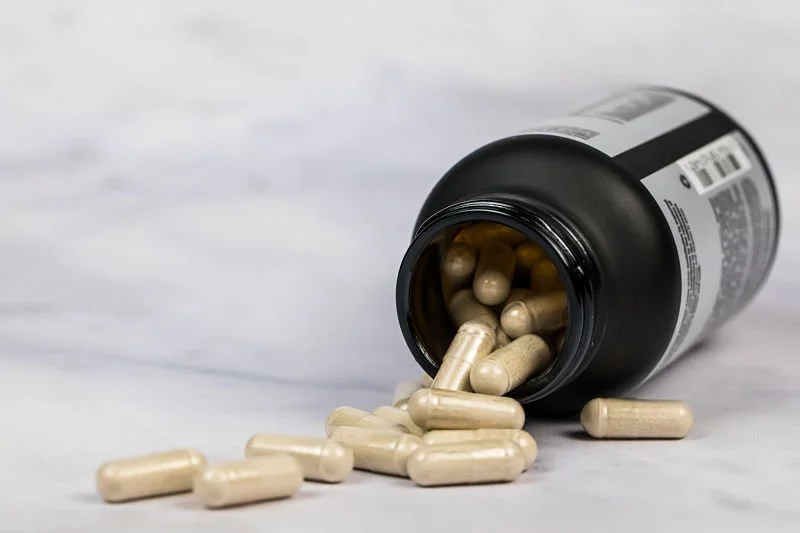
Safety and Who Should Avoid Supplements
Safety is one of the most important factors when discussing acne supplements.
Supplements for acne to avoid
Some products marketed online have little or no evidence to support their claims. Herbal blends and unverified powders may not treat acne and could cause side effects. Dermatologists recommend sticking to ingredients with published evidence rather than hype.
Interactions, pregnancy warnings, and red flags
Pregnant and breastfeeding women should avoid high doses of vitamin A and certain herbal blends. Supplements can interact with prescription medications, including acne drugs. Patients should also avoid products that lack third-party testing.
Conditions and medications that raise risks
Patients with liver disease, kidney problems, or those taking blood thinners should be cautious with supplementation. High doses of vitamin A, vitamin E, and fish oil can create risks in these situations. Reviewing each supplement with a dermatologist is the safest approach.
How Supplements Fit Into Acne Care
Supplements are not a cure, but they may be helpful as part of a comprehensive care plan.
Are supplements enough to clear acne?
Supplements rarely clear acne on their own. They may improve acne in mild cases or when deficiencies exist, but most patients need prescription treatments for consistent results. Supplements should be considered supportive tools.
Combining with dermatologist-prescribed treatments
The best results come from using supplements alongside prescription treatments. For example, fish oil and probiotics may reduce dryness or irritation caused by oral medications. DermOnDemand helps patients identify safe combinations and avoid unnecessary risks.
What timeline to expect for clearer skin
Supplements take weeks or months to show any effect. Patients should not expect overnight results. Dermatologists advise re-evaluating progress within 8 to 12 weeks and adjusting care if results are not clear.
Fastest Path to Results
While supplements can support skin health, the fastest way to treat acne remains prescription care.
Why online dermatology beats guesswork
DermOnDemand offers access to board-certified dermatologists within 24 hours. Patients complete a secure form, and experts like Dr. Alicia Atkins review the case. This avoids months of trial and error with supplements alone.
What to share with your dermatologist
Patients should share all supplements they are taking, including vitamins and minerals, herbal products, and over-the-counter blends. This helps dermatologists spot interactions and adjust prescriptions safely. Being open about dietary supplementation improves treatment outcomes.
Frequently Asked Questions
Supplements can support skin health, but they rarely treat acne on their own. Most patients need prescription treatments for lasting results.
Vitamin B12 can sometimes trigger breakouts in sensitive patients. Always review your supplement list with a dermatologist before starting or changing doses.
There is no single best supplement for acne. Options like zinc, fish oil, probiotics, and some B vitamins may help, but effectiveness varies by person.
Supplements may support overall skin cell repair, but they cannot remove acne scars. Procedures such as lasers or microneedling are more effective for improving the appearance of visible scars.
In the United States, the Food and Drug Administration regulates supplements as foods, not drugs. This means they are not reviewed for safety and effectiveness in the same way as medications.
Start Your Online Dermatology Plan
Skip the trial-and-error approach. Book your private consultation with DermOnDemand and receive a prescription-grade plan tailored to your needs within 24 hours.



